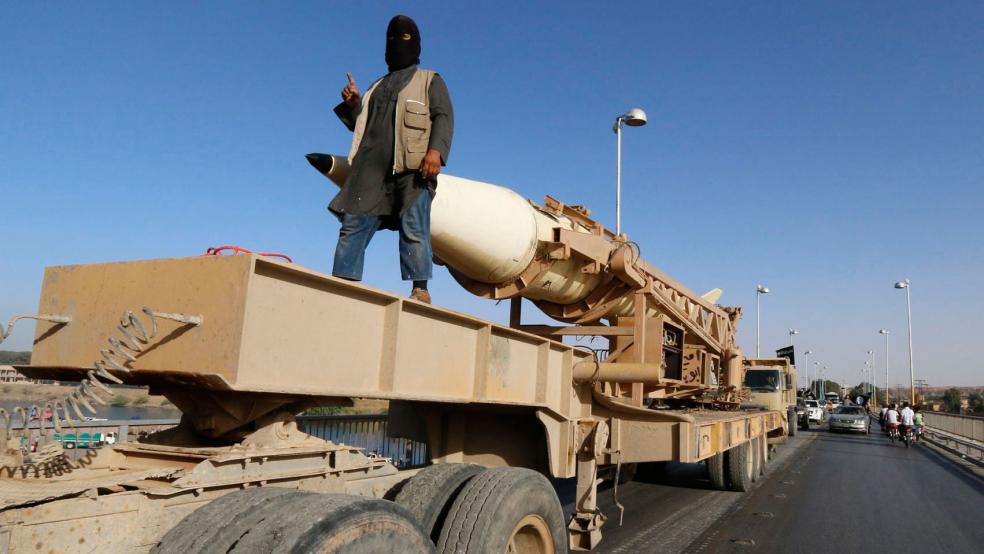Over the last six months, the world watched helplessly while Yemen descended from a country with a legitimate government into a civil war caused by an unlawful occupation of the country's capital and several other provinces by the Houthi rebels. The death toll of the coordinated suicide attacks on two Shiite mosques in Sanaa on Friday is now more than 130 people and ISIS is claiming responsibility for the attacks.
Then, after a week of fighting between the Houthi-controlled air force and special forces, which bombed the legitimate president's residence in the southern city of Adin and tried to control Adin airport, $500 million worth of U.S. arms and equipment went missing.
Related: U.S. Weapons Worth $500 Million Vanish in Yemen
Today, with Sunni tribes fighting alongside al-Qaeda against the Houthis, the Yemen 24 is actually in a state of sectarian civil war, opening the door to a surge of both al-Qaeda and ISIS and their nefarious activities.
Al-Qaeda's branch in Yemen, which is called al-Qaeda in the Arabian Peninsula or AQAP, is considered the most dangerous and active branch of the terror organization. The last several serious attempts to attack the U.S. homeland were carried out by AQAP operatives or were inspired by them.
Last September, the Houthi rebels who fought the government for more than a decade captured the capital Sanaa, while the army stood idle. The rebels captured also other provinces, forcing the president to leave the capital. Yemen was one of the six Arab nations that witnessed revolutions as part of the Arab Spring. A yearlong youth-led revolution forced out the corrupt dictator Ali Abdulla Salih after 33 years in power. He left office only after securing a deal that granted him immunity from prosecution, even though his forces killed hundreds of Yemen youth calling for democracy.
While Yemenis honored their deal, Salih didn't comply. He conspired with the Houthi rebels with whom he launched six massive military campaigns during the last decade of his reign. With the help of his men who still control much of the Yemeni military, the Houthis captured the entire northern part of the country, including Sanaa and advanced to the south as well.
Related: ISIS Attacks Tunisia, the Sole Arab Spring Success
The Houthis are a Shiite paramilitary movement similar in many ways to the Sadr movement in Iraq and Hezbollah in Lebanon. As with the Lebanese and Iraqi movements, the Houthis have support from Iran. Yemen is roughly 60 percent Sunni and 40 percent Shiite Zaidis. Both sects ruled the country over the centuries.
The former dictator was a secular Zaidi Shiite. The fact that an Islamic Shiite Zaidi movement is ruling Yemen now has provoked the Sunni majority centered in the southern and eastern part of Yemen. His Sunni successor has found refuge in the southern capital Adin, and the conflict is increasingly taking a sectarian shape.
A civil war in Yemen could have a catastrophic impact on regional and global security. Yemen's strategic geographic location gives an enormous rules geopolitical advantage to those who run the country. With a long coast on the Red Sea and the Indian Ocean, Yemen can control oil supplies coming from the Persian Gulf to Europe. Yemen is also the southern neighbor of Saudi Arabia. Any unrest will eventually destabilize the oil-rich kingdom.
Yemen is also a neighbor to the horn of Africa, where Somalia is located, a country that is suffering unrest and the presence of extreme Islamic movements and al-Qaeda. Moreover, a civil war in Yemen will probably revive the acts of sea mercenaries and pirates who have recently been curbed.
Related: With Yemen in Chaos, al-Qaeda Terrorists Are Unleashed
Yemen's legitimate toppled President Abd Rabbah Mansour Hadi is an ally in the war against terror. When he lost his capital, the U.S. embassy was closed. Several western and Arab embassies closed as well. The U.S. embassy hosted a very active CIA station that was forced to close too. The decade-long war against al-Qaeda in Yemen that witnessed the use of unmanned drones relied on that station for intelligence.
A hostile situation in Yemen 15 years ago prevented the FBI’s top al-Qaeda experts from uncovering the 9/11 plot in 2000 and 2001 while investigating the attack on the USS Cole in 2000.
Now, al-Qaeda is not only resurging, it has found allies among the angry Sunni tribes who want the Houthis out of their territories. It is also seizing the dismantled Yemeni army arms and equipment. In one instance last February, they captured the equipment of an entire army brigade. This will translate into a safe haven for training and recruiting operatives and planning and executing terror plots in Europe and the U.S.
The two brothers who carried out the attacks on the Charlie Hebdo magazine in Paris in January 2015 were AQAP operatives. It is worth remembering that Osama bin Laden's father was a Yemeni who immigrated to Saudi Arabia where he established his construction firm and befriended the Saudi royal family, who granted massive contracts that made him a billionaire.
Related: Why America's War with ISIS Will Take Years
Already engaged in wars against the Iraqi, Syrian, Egyptian and Libyan governments, ISIS has always been a master of exploiting sectarian and political crises. In Iraq and Syria, it built its presence on the divide between the Shiite government (Alawite in Syria) and the Sunni angry population. In Egypt and Libya, it did so by exploiting the conflict between the Muslim Brotherhood and the secular governments. Now, ISIS has a new sectarian war that could be turned into a hub for the terror state.
Friday's attacks on the mosques were a classic ISIS tactic that was planned in Iraq like hundreds of similar attacks over the last 12 years. In February 2006, one of these attacks, aimed at al-Askari shrine in Samarra, started the Iraqi sectarian war in 2006 and 2007, which opened the way for ISIS to control much of the Sunni part of Iraq. That war was stopped only by the U.S. surge of ground forces in 2007.
Finally, Yemen's civil war could be the ideal theater where a deadly and dangerous alliance between al-Qaeda and ISIS may emerge to fight the joint Shiite enemy.
Top Reads from The Fiscal Times:





